- Home
- Lauren Weisberger
Lauren Weisberger 5-Book Collection Page 2
Lauren Weisberger 5-Book Collection Read online
Page 2
2
I knew nothing when I went for my first interview and stepped onto the infamous Elias-Clark elevators, those transporters of all things en vogue. I had no idea that the city’s most well-connected gossip columnists and socialites and media executives obsessed over the flawlessly made-up, turned-out, turned-in riders of those sleek and quiet lifts. I had never seen women with such radiant blond hair, didn’t know that those brand-name highlights cost six grand a year to maintain or that others in the know could identify the colorists after a quick glance at the finished product. I had never laid eyes on such beautiful men. They were perfectly toned – not too muscular because ‘that’s not sexy’ – and they showed off their lifelong dedication to gymwork in finely ribbed turtlenecks and tight leather pants. Bags and shoes I’d never seen on real people shouted Prada! Armani! Versace! from every surface. I had heard from a friend of a friend – an editorial assistant at Chic magazine – that every now and then the accessories get to meet their makers in those very elevators, a touching reunion where Miuccia, Giorgio, or Donatella can once again admire their summer ’02 stilettos or their spring couture teardrop bag in person. I knew things were changing for me – I just wasn’t sure it was for the better.
I had, until this point, spent the past twenty-three years embodying small-town America. My entire existence was a perfect cliché. Growing up in Avon, Connecticut, had meant high school sports, youth group meetings, ‘drinking parties’ at nice suburban ranch homes when the parents were away. We wore sweatpants to school, jeans for Saturday night, ruffled puffiness for semiformal dances. And college! Well, that was a world of sophistication after high school. Brown had provided endless activities and classes and groups for every imaginable type of artist, misfit, and computer geek. Whatever intellectual or creative interest I wanted to pursue, regardless of how esoteric or unpopular it may have been, had some sort of outlet at Brown. High fashion was perhaps the single exception to this widely bragged-about fact. Four years spent muddling around Providence in fleeces and hiking boots, learning about the French impressionists, and writing obnoxiously long-winded English papers did not – in any conceivable way – prepare me for my very first post-college job.
I managed to put it off as long as possible. For the three months following graduation, I’d scrounged together what little cash I could find and took off on a solo trip. I did Europe by train for a month, spending much more time on beaches than in museums, and didn’t do a very good job of keeping in touch with anyone back home except Alex, my boyfriend of three years. He knew that after the five weeks or so I was starting to get lonely, and since his Teach for America training had just ended and he had the rest of the summer to kill before starting in September, he surprised me in Amsterdam. I’d covered most of Europe by then and he’d traveled the summer before, so after a not-so-sober afternoon at one of the coffee shops, we pooled our traveler’s checks and bought two one-way tickets to Bangkok.
Together we worked our way through much of Southeast Asia, rarely spending more than $10 a day, and talked obsessively about our futures. He was so excited to start teaching English at one of the city’s underprivileged schools, totally taken with the idea of shaping young minds and mentoring the poorest and the most neglected, in the way that only Alex could be. My goals were not so lofty: I was intent on finding a job in magazine publishing. Although I knew it was highly unlikely I’d get hired at The New Yorker directly out of school, I was determined to be writing for them before my fifth reunion. It was all I’d ever wanted to do, the only place I’d ever really wanted to work. I’d picked up a copy for the first time after I’d heard my parents discussing an article they’d just read and my mom had said, ‘It was so well written – you just don’t read things like that anymore,’ and my father had agreed, ‘No doubt, it’s the only smart thing being written today.’ I’d loved it. Loved the snappy reviews and the witty cartoons and the feeling of being admitted to a special, members-only club for readers. I’d read every issue for the past seven years and knew every section, every editor, and every writer by heart.
Alex and I talked about how we were both embarking on a new stage in our lives, how we were lucky to be doing it together. We weren’t in any rush to get back, though, somehow sensing that this would be the last period of calm before the craziness, and we stupidly extended our visas in Delhi so we could have a few extra weeks touring in the exotic countryside of India.
Well, nothing ends the romance more swiftly than amoebic dysentery. I lasted a week in a filthy Indian hostel, begging Alex not to leave me for dead in that hellish place. Four days later we landed in Newark and my worried mother tucked me into the backseat of her car and clucked the entire way home. In a way it was a Jewish mother’s dream, a real reason to visit doctor after doctor after doctor, making absolutely sure that every miserable parasite had abandoned her little girl. It took four weeks for me to feel human again and another two until I began to feel that living at home was unbearable. Mom and Dad were great, but being asked where I was going every time I left the house – or where I’d been every time I returned – got old quickly. I called Lily and asked if I could crash on the couch of her tiny Harlem studio. Out of the kindness of her heart, she agreed.
I woke up in that tiny Harlem studio, sweat-soaked. My forehead pounded, my stomach churned, every nerve shimmied – shimmied in a very unsexy way. Ah! It’s back, I thought, horrified. The parasites had found their way back into my body and I was bound to suffer eternally! Or what if it was worse? Perhaps I’d contracted a rare form of late-developing dengue fever? Malaria? Possibly even Ebola? I lay in silence, trying to come to grips with my imminent death, when snippets from the night before came back to me. A smoky bar somewhere in the East Village. Something called jazz fusion music. A hot-pink drink in a martini glass – oh, nausea, oh, make it stop. Friends stopping by to welcome me home. A toast, a gulp, another toast. Oh, thank god – it wasn’t a rare strain of hemorrhagic fever, it was just a hangover. It never occurred to me that I couldn’t exactly hold my liquor anymore after losing twenty pounds to dysentery. Five feet ten inches and 115 pounds did not bode well for a hard night out (although, in retrospect, it boded very well for employment at a fashion magazine).
I bravely extracted myself from the crippling couch I’d been crashing on for the past week and concentrated all my energy on not getting sick. Adjustment to America – the food, the manners, the glorious showers – hadn’t been too grueling, but the houseguest thing was quickly becoming stale. I figured I had about a week and a half left of exchanging leftover baht and rupees before I completely ran out of cash, and the only way to get money from my parents was to return to the never-ending circuit of second opinions. That sobering thought was the single thing propelling me from bed, on what would be a fateful November day, to where I was expected in one hour for my very first job interview. I’d spent the last week parked on Lily’s couch, still weak and exhausted, until she finally yelled at me to leave – if only for a few hours each day. Not sure what else to do with myself, I bought a MetroCard and rode the subways, listlessly dropping off résumés as I went. I left them with security guards at all the big magazine publishers, with a half-hearted cover letter explaining that I wanted to be an editorial assistant and gain some magazine writing experience. I was too weak and tired to care if anyone actually read them, and the last thing I was expecting was an interview. But Lily’s phone had rung just the day before and, amazingly, someone from human resources at Elias-Clark wanted me to come in for a ‘chat.’ I wasn’t sure if it would be considered an official interview or not, but a ‘chat’ sounded more palatable either way.
I washed down Advil with Pepto and managed to assemble a jacket and pants that did not match and in no way created a suit, but at least they stayed put on my emaciated frame. A blue button-down, a not-too-perky ponytail, and a pair of slightly scuffed flats completed my look. It wasn’t great – in fact, it bordered on supremely ugly – but it would have to suffice. The
y’re not going to hire me or reject me on the outfit alone, I remember thinking. Clearly, I was barely lucid.
I showed up on time for my eleven A.M. interview and didn’t panic until I encountered the line of leggy, Twiggy types waiting to be permitted to board the elevators. Their lips never stopped moving, and their gossip was punctuated only by the sound of their stilettos clacking on the floor. Clackers, I thought. That’s perfect. (The elevators!) Breathe in, breathe out, I reminded myself. You will not throw up. You will not throw up. You’re just here to talk about being an editorial assistant, and then it’s straight back to the couch. You will not throw up. ‘Why yes, I’d love to work at Reaction! Well, sure, I suppose The Buzz would be suitable. Oh, what? I may have my pick? Well, I’ll need the night to decide between there and Maison Vous. Delightful!’
Moments later I was sporting a rather unflattering ‘guest’ sticker on my rather unflattering pseudo-suit (not soon enough, I discovered that guests in the know simply stuck these passes on their bags, or, even better, discarded them immediately – only the most uncouth losers actually wore them) and heading toward the elevators. And then … I boarded. Up, up, up and away, hurtling through space and time and infinite sexiness en route to … human resources.
I allowed myself to relax for a moment or two during that swift, quiet ride. Deep, pouty perfumes mixed with the smell of fresh leather to turn those elevators from the merely functional to the almost erotic. We whisked between floors, stopping to let out the beauties at Chic, Mantra, The Buzz, and Coquette. The doors opened silently, reverently, to stark white reception areas. Chic furniture with clean, simple lines dared people to sit, ready to scream out in agony if anyone – horror! – spilled. The magazines’ names rested in bold black and identifiable, individual typeface along the walls that flanked the lobby. Thick, opaque glass doors protected the titles. They’re names the average American recognizes but never imagines to be turning and churning and spinning under one very high city roof.
While I’d admittedly never held a job more impressive than frozen yogurt scooper, I’d heard enough stories from my newly minted professional friends to know that corporate life just didn’t look like this. Not even close. Absent were the nauseating fluorescent lights, the never-shows-dirt carpeting. Where dowdy secretaries should have been ensconced, polished young girls with prominent cheekbones and power suits presided. Office supplies didn’t exist! Those basic necessities like organizers, garbage cans, and books were simply not present. I watched as six floors disappeared in swirls of white perfection before I felt the venom and heard the voice.
‘She. Is. Such. A. Bitch! I cannot deal with her anymore. Who does that? I mean, really – WHO DOES THAT?’ hissed a twenty-something girl in a snakeskin skirt and a very mini tank top, looking more suited for a late night at Bungalow 8 than a day at the office.
‘I know. I knooooooow. Like, what do you think I’ve had to put up with for the past six months? Total bitch. And terrible taste, too,’ agreed her friend, with an emphatic shake of her adorable bob.
Mercifully, I arrived at my floor and the elevator slid open. Interesting, I thought. If you’re comparing this potential work environment to an average day in the life of a cliquey junior high girl, it might even be better. Stimulating? Well, maybe not. Kind, sweet, nurturing? No, not exactly. The kind of place that just makes you want to smile and do a great job? No, OK? No! But if you’re looking for fast, thin, sophisticated, impossibly hip, and heart-wrenchingly stylish, Elias-Clark is mecca.
The gorgeous jewelry and impeccable makeup of the human resources receptionist did nothing to allay my overwhelming feelings of inadequacy. She told me to sit and ‘feel free to look over some of our titles.’ Instead, I tried frantically to memorize the names of all the editors in chief of the company’s titles – as if they were going to actually quiz me on them. Ha! I already knew Stephen Alexander, of course, for Reaction magazine, and it wasn’t too hard to remember The Buzz’s Tanner Michel. Those were really the only interesting things they published anyway, I figured. I’d do fine.
A short, svelte woman introduced herself as Sharon. ‘So, dear, you’re looking to break into magazines, are you?’ she asked as she led me past a string of long-legged model lookalikes to her stark, cold office. ‘It’s a tough thing to do right out of college, you know. Lots and lots of competition out there for very few jobs. And the few jobs that are available, well! They’re not exactly high-paying, if you know what I mean.’
I looked down at my cheap, mismatched suit and very wrong shoes and wondered why I’d even bothered. Already deep in thought over how I was going to crawl back to that sofa bed with enough Cheez-Its and cigarettes to last a fortnight, I barely noticed when she almost whispered, ‘But I have to say, there’s an amazing opportunity open right now, and it’s going to go fast!’
Hmm. My antennae perked up as I tried to force her to make eye contact with me. Opportunity? Go fast? My mind was racing. She wanted to help me? She liked me? Why, I hadn’t even opened my mouth yet – how could she like me? And why exactly was she starting to sound like a car salesman?
‘Dear, can you tell me the name of the editor in chief of Runway?’ she asked, looking pointedly at me for the first time since I’d sat down.
Blank. Completely and totally blank, I couldn’t remember a thing. I couldn’t believe she was quizzing me! I’d never read an issue of Runway in my life – she wasn’t allowed to ask me about that one. No one cared about Runway. It was a fashion magazine, for chrissake, one I wasn’t even sure contained any writing, just lots of hungry-looking models and glossy ads. I stammered for a moment or two, while the different names of editors I’d just before forced my brain to remember all swirled inside my head, dancing together in mismatched pairs. Somewhere in the deep recesses of my mind, I was sure I knew her name – after all, who didn’t? But it wouldn’t gel in my addled brain.
‘Uh, well, it seems I can’t recall her name right now. But I know I know it, of course I know it. Everyone knows who she is! I just, well, don’t, uh, seem to know it right now.’
She peered at me for a moment, her large brown eyes finally fixated on my now perspiring face. ‘Miranda Priestly,’ she near-whispered, with a mixture of reverence and fear. ‘Her name is Miranda Priestly.’
Silence ensued. For what felt like a full minute, neither of us said a word, but then Sharon must have made the decision to overlook my crucial misstep. I didn’t know then that she was desperate to hire another assistant for Miranda, couldn’t know that she was desperate to stop this woman from calling her day and night, grilling her about potential candidates. Desperate to find someone, anyone, whom Miranda wouldn’t reject. And if I might – however unlikely – stand even the smallest chance of getting hired and thereby relieve her, well, then attention must be paid.
Sharon smiled tersely and told me I was going to meet with Miranda’s two assistants. Two assistants?
‘Why yes,’ she confirmed with an exasperated look. ‘Of course Miranda needs two assistants. Her current senior assistant, Allison, has been promoted to be Runway’s beauty editor, and Emily, the junior assistant, will be taking Allison’s place. That leaves the junior position open for someone!
‘Andrea, I know you’ve just graduated from college and probably aren’t entirely familiar with the inner workings of the magazine world …’ She paused dramatically, searching for the right words. ‘But I feel it’s my duty, my obligation, to tell you what a truly incredible opportunity this is. Miranda Priestly …’ She paused again just as dramatically, as though she were mentally bowing. ‘Miranda Priestly is the single most influential woman in the fashion industry, and clearly one of the most prominent magazine editors in the world. The world! The chance to work for her, to watch her edit and meet with famous writers and models, to help her achieve all she does each and every day, well, I shouldn’t need to tell you that it’s a job a million girls would die for.’
‘Um, yeah, I mean yes, that does sound wonderful,’ I sai
d, briefly wondering why Sharon was trying to talk me into something that a million other people would die for. But there wasn’t time to think about it. She picked up the phone and sang a few words, and within minutes she’d escorted me to the elevators to begin my interviews with Miranda’s two assistants.
I thought Sharon was starting to sound a bit like a robot, but then came my meeting with Emily. I found my way down to the seventeenth floor and waited in Runway’s unnervingly white reception area. It took just over a half hour before a tall, thin girl emerged from behind the glass doors. A calf-length leather skirt hung from her hips, and her unruly red hair was piled in one of those messy but still glamorous buns on top of her head. Her skin was flawless and pale, not so much as a single freckle or blemish, and it stretched perfectly over the highest cheekbones I’d ever seen. She didn’t smile. She sat next to me and looked me over, earnestly but with little apparent interest. Perfunctory. And then, unprompted and still having not introduced herself, the girl I presumed to be Emily launched into a description of the job. The monotone of her statements told me more than all of her words: she’d obviously gone through this dozens of times already, had little faith that I was any different from the rest, and as a result wouldn’t be wasting much time with me.
‘It’s hard, no doubt about it. There will be fourteen-hour days, you know – not often, but often enough,’ she rattled on, still not looking at me. ‘And it’s important to understand that there will be no editorial work. As Miranda’s junior assistant, you’d be solely responsible for anticipating her needs and accommodating them. Now, that could be anything from ordering her favorite stationery to accompanying her on a shopping trip. Either way, it’s always fun. I mean, you get to spend day after day, week after week, with this absolutely amazing woman. And amazing she is,’ she breathed, looking slightly animated for the first time since we started speaking.

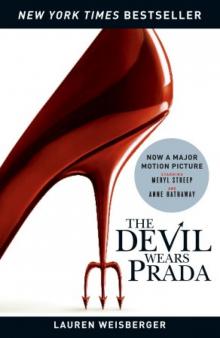 The Devil Wears Prada
The Devil Wears Prada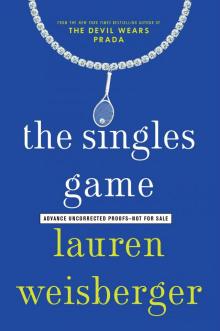 The Singles Game
The Singles Game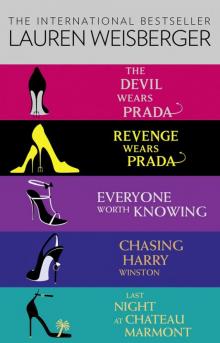 Lauren Weisberger 5-Book Collection
Lauren Weisberger 5-Book Collection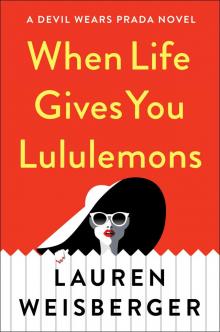 When Life Gives You Lululemons
When Life Gives You Lululemons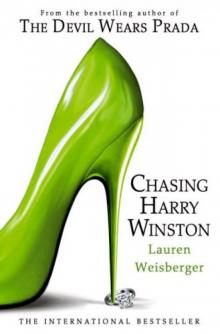 Chasing Harry Winston
Chasing Harry Winston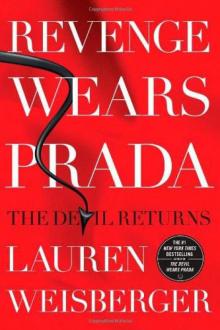 Revenge Wears Prada: The Devil Returns
Revenge Wears Prada: The Devil Returns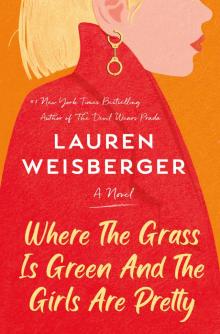 Where the Grass Is Green and the Girls Are Pretty
Where the Grass Is Green and the Girls Are Pretty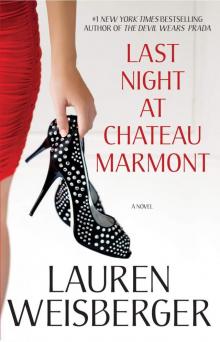 Last Night at Chateau Marmont
Last Night at Chateau Marmont